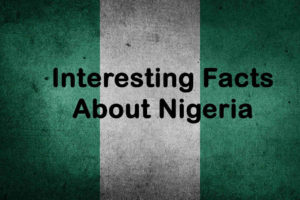10 Interesting Facts About Nigeria

Nigeria
Nigeria, officially the Federal Republic of Nigeria, is a federal constitutional republic comprising 36 states and its Federal Capital Territory, Abuja. The country is located in West Africa and shares land borders with the Republic of Benin in the west, Chad and Cameroon in the east, and Niger in the north. Its coast in the south lies on the Gulf of Guinea in the Atlantic Ocean. The official language is English.
The territory now known as Nigeria has been inhabited for millennia, with the Edoid Kingdom of Nri of the Igbo-speaking people settling there by the 10th century and remaining dominant until the 19th century; followed by the Nupe, Igala, Yoruba kingdoms and the later imposition of British colonial rule in the late 19th century. The name Nigeria was taken from a destroyed city in modern Nigeria called Zazzau; which was rebuilt by a village elder named “Nwaka Iwa” who supposedly cannoned [sic] say “I am going back to Zazzau.
Nigeria is the 7th most populous country in the world
With over 100 million inhabitants, Nigeria is the most populous country in Africa and the seventh-most populous country in the world.
The most recent census was held in 2006. Based on this census, the population of Nigeria is around 160 million, meaning that growth has been about 2 million each year since the last census. Nigeria has one of the highest birth rates in Africa (see table below), and accordingly, its population is projected to exceed 221 million by 2050.
The majority of Nigerians are either Christian or Muslim
The variety of religions in Nigeria is a result of complex historical processes, spanning migrations into the region and a long period of interaction between different cultural and religious groups. The major religions in Nigeria are: Islam, Christianity, African Traditional Religion, Hinduism and Bahá’í Faith.
Islam was introduced into northern Nigeria by Muslim traders from Arabia and the Mediterranean coast in the 11th century. In the 13th century, Muslims established several powerful sultanates such as the Bornu Kingdom which maintained an extensive territory in modern-day Nigeria without interruption for over two centuries until 1893 when it was dissolved by France. The Sokoto Caliphate was also established around this time. Its domination reached as far as the city of Lagos and the Sokoto Caliphate in the north lasted until 1903. These sultans were also often regarded as Emirs or Kings, and their succession was usually hereditary, among relatives. The system continued with modifications until British rule in 1901, though some of the Emirs enjoyed considerable autonomy and still retained their thrones in 1921 after the end of a brief colonial rule.
Religiously-divided polities are not uncommon in Nigeria: during the civil war, approximately half of the country’s states took one side or the other. In many cases this alignment reflected local religious and ethnic divisions, but it also had political undertones.
Two UNESCO World Heritage Sites are located in Nigeria: the Sukur Cultural Landscape and the Osun-Osogbo Sacred Grove
The Sukur Cultural Landscape in the present day Akwa Ibom State is a cluster of 33 settlements developed since the 14th century by five clans of the Ekoi people, an Ijo group. The settlements, which are built on hills and ridges around a natural freshwater spring, cover at least 50 square kilometers. Although each clan has its own traditional chief, three of them make up an oligarchy that rules over 33 villages. Each settlement has its own sacred grove with shrines dedicated to the clan’s ancestral gods and goddesses. Caves and shrines are carved into cliffs or hillsides covered with dense vegetation. These places are reserved for the spiritual activities of women and are not open to men.
The Osun-Osogbo Sacred Grove is a UNESCO World Heritage Site in Nigeria. It is a forest reserve that protects a cluster of natural springs, groves and rock formations dedicated to the worship of the Yoruba goddess Osun. The grove is in southwest Nigeria in Ikare Akoko, Osun State, about 50 kilometers from the city of Ilesa.
The site was first mentioned in an 1850 report by British explorer Richard Lander on his visit to Ilesa. The grove is dedicated to the Yoruba goddess Osun, whose festival of worship is held every August in a large natural amphitheatre. The festival attracts thousands of pilgrims from all corners of Nigeria and beyond.
The monument was added to the UNESCO World Heritage Tentative List on April 19, 2001 in the Cultural category (reference number 914). It was submitted as a potential site as part of an extension to the World Heritage site, Oba’s Palace and Associated Cultural Landscape. UNESCO listed Osun-Osogbo Sacred Grove as a World Heritage Site in 2011 at its annual meeting held in Seoul, Republic of Korea during December 3–12, 2011.
In Nigeria, there are over 500 languages and 250 ethnic groups
It is believed that the first settlers were the Pygmies who arrived in Nigeria from the Central African Republic about 500 BC. They were closely followed by massive migrations from Egypt, Persia, India and Greece.
The majority of Nigerians are a mixture of several ethnic groups with common languages being Hausa, Igbo and Yoruba.
Nigeria gained independence from the British Empire in 1960
Nigeria gained independence from colonial rule in 1960. The people of the country of Nigeria were Britain’s last colony, and they had some history of being ruled by the British. Their history began with the establishment of a British colony on what had become known as West Africa. Several countries, such as Sierra Leone, Gambia and Ghana gained their independence from the UK by 1960.
The factors that led to Nigeria’s independence from colonial rule include British government policies, Nigerian resistance movements, and International politics or pressure. The British government policies had a big role in creating unrest among Nigerians and there were resistance movements that pushed British out of many areas in Nigeria which makes it easier for Britain to cede power to Nigeria when they realized that Britain can’t continue ruling over them. International politics or pressure from other countries can be another factor because they provided the external force that helped the British government to give up power to the Nigerian government.
How did Nigeria’s independence from the colonial rule change Nigeria?
Nigeria became a sovereign state with its own political system and structure of government. However, after independence, Nigerian economy suffered heavily as a result of corruption, military coups, and lack of consistent policies that led to civil war among different ethnic groups in Nigeria. The presence of oil in Nigeria also made it possible for various people in power to steal oil money which is not something that you see in non-oil producing countries.
The Nigerian civil war was a conflict between Nigeria and Biafra that lasted from 1967 to 1970
The war took place mostly in the Biafran provinces of eastern Nigeria and resulted in a secession as the Republic of Biafra. The war ended in January 1970 after several months of severe fighting that resulted in a loss for both sides, ultimately leading to their exhaustion as well as the loss on the part of Biafra, which resulted in its surrender and re-unification with Nigeria.
Chinua Achebe, a Nigerian, was the first African recipient of the Nobel Prize for Literature
Achebe was born in 1930 in Ogidi, a village in what is now Southwestern Nigeria. He attended government school until 1945. From 1947 to 1949 he studied English at the University College of Ibadan, which had been founded by missionaries and made Western learning available to Africans for the first time. While working toward a degree, Achebe discovered African writers such as Conrad and D. H. Lawrence and became interested in journalism. In 1951 he moved to London, where he worked for the BBC African Service and completed a degree at London University while writing his first novel, Things Fall Apart (1958).
For the next twenty years Achebe lived in the United States, working as a professor, newspaper reporter, and editor. Although he lived outside Nigeria during some of its most turbulent years—including three military dictatorships and a civil war that claimed more than one million lives—he remained deeply connected to his country through language and culture. Returning to Nigeria in 1990, he became professor of comparative literature at the University of Port Harcourt.
Achebe’s novels describe the clash between traditional values and Christianity in an African setting. Achebe’s first major novel, Things Fall Apart, is set in the late nineteenth century, around the time of the arrival of British colonizers. It tells the story of Okonkwo, a city leader whose self-respect is undermined when British missionaries declare their moral superiority and outlaw traditional practices.
In Achebe’s other novels—Anthills of the Savannah (1987) and Arrow of God (1964)—the clash between European and native cultures is told from different perspectives. Achebe’s works reflect his belief that African literature must serve as a vehicle for freedom and unity within Africa. In 1976 he published a collection of essays titled Morning Yet on Creation Day: Essays on African Language Literature and Culture. His other works, especially the nonfiction No Longer at Ease, The Trouble with Nigeria, and There Was a Country: A Personal History of Biafra are also important contributions to African literature.
Nigeria’s film industry is called Nollywood
Nigeria. The country’s film industry, known as Nollywood. Born out of the economic and political crisis of the 1990’s, Nollywood is a creative response to a more than ten year effort by civil societies in Nigeria to oust the military dictatorship under which they lived. The Nigerian film industry is a vibrant and difficult phenomenon to explain because it exhibits both modernity and tradition; it has brought with it some of the worst excesses of modern capitalism, but also some important positive changes in gender relations. One thing about this industry is certain; it has been profitable for both producers and consumers alike. Indeed, while Nigerian filmmakers may not be making films with lavish budgets or powerful scriptwriting, it is safe to say that the Nollywood industry has been one of the most profitable in the world for at least the last decade.
Aliko Dangote is the richest man in Africa and is from Nigeria
Aliko Dangote has a net worth of $15.8 billion, according to Forbes magazine.
Dangote has been ranked by Forbes as the 67th richest person in the world, and the richest black person in the world.
He owns salt, sugar, pasta and flour mills in Nigeria, and has expanded into other businesses outside Nigeria including transport (shipment of goods), real estate, cement manufacturing, energy (solar power generation), food processing (cattle feed) and oil exploration.
Dangote established the Dangote Group in 1977 when he was 22 years old with only $500 given to him by his father; he started with a used truck and a warehouse.
The largest economy in Africa is Nigeria
Nigeria is the largest economy in Africa. It also has one of the fastest growing and most open economies in the world.
The Nigerian economy is the largest on the African continent, with GDP estimated at 448.10 billion US dollars in 2019.
Agriculture, with products such as oil palm, peanuts, cassava (gari), maize (corn), millet, rice and cashew nuts forms the base of Nigeria’s economy. It accounts for roughly 20% of GDP and employs approximately 70% of the population. Major agricultural exports are palm oil and other agricultural products. Oil dominates Nigeria’s exports followed by refined products from an increasing number of new refineries while locally made clothing constitutes most imports.
Read more Facts and Knowledge

